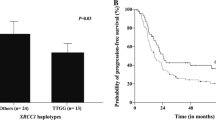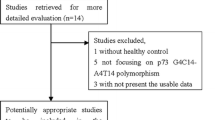Abstract
The tumor suppressor gene phosphatase and tensin homologue (PTEN) plays a significant role in regulating cell growth, proliferation, and apoptosis. However, there are no data regarding the role of PTEN polymorphisms in the development of oral squamous cell carcinoma (OSCC). A hospital-based case–control study was conducted to investigate the potential association between PTEN polymorphisms and the risk of OSCC in a Chinese Han population. The study population comprised 201 patients with OSCC and 199 healthy controls. Seventeen single-nucleotide polymorphisms (SNPs) of PTEN were investigated and genotyped using Sequenom Mass ARRAY and iPLEX-MALDI-TOF technology. The observed genotype frequencies of these polymorphisms were in agreement with Hardy-Weinberg equilibrium in the control group (P > 0.05 for all). The heterozygous CT genotype was not associated with significantly increased risk for OSCC (OR = 0.89, 95 % CI = (0.55–1.42), P = 0.83), the TT genotype was not associated with increased risk for OSCC (OR = 1.01, 95 % CI = (0.58–1.74), P = 0.74) compared to the PTEN SNP rs1234224 homozygous CC genotype. Meanwhile, CT/TT variants were not associated with increased risk for OSCC compared with the CC genotype (OR = 0.93, 95 % CI = 0.60–1.44, P = 0.73). The T allele was not associated with significantly increased risk compared to the C allele (OR = 0.99, 95 % CI = 0.72–1.58, P = 0.69). Similar associations with the risk of OSCC were observed for the other genotypes of PTEN gene polymorphisms. There were no significant differences in the distribution of the genotype and allele frequencies of polymorphisms of the PTEN gene between the OSCC patients and controls in a Chinese Han population. Further studies are needed to clarify the specific roles of PTEN polymorphisms in the etiology of OSCC.
Similar content being viewed by others
References
Johnson NW, Warnakulasuriya S, Gupta PC, Dimba E, Chindia M, Otoh EC, et al. Global oral health inequalities in incidence and outcomes for oral cancer: causes and solutions. Adv Dent Res. 2011;23(2):237–46.
Petersen PE. Oral cancer prevention and control—the approach of the World Health Organization. Oral Oncol. 2009;45:454–60.
Robinson PN, Mickelson AR. Early diagnosis of oral cavity cancers. Otolaryngol Clin North Am. 2006;39(2):306.
Messadi DV. Diagnostic aids for detection of oral precancerous conditions. Int J Oral Sci. 2013;5:59–65.
Stadler ME, Patel MR, Couch ME, Hayes DN. Molecular biology of head and neck cancer: risks and pathways. Hematol Oncol Clin North Am. 2008;22:1099–124.
Yin Y, Shen WH. PTEN: a new guardian of the genome. Oncogene. 2008;27(41):5443–53.
Furnari FB, Huang HJ, Cavenee WK. The phosphoinositol phosphatase activity of PTEN mediates a serum sensitive G1 growth arrest in glioma cells. Cancer Res. 1998;58:5002–8.
Davies MA, Koul D, Dhesi H, Berman R, et al. Regulation of Akt/PKB activity, cellular growth, and apoptosis in prostate carcinoma cells by MMAC/PTEN. Cancer Res. 1999;59:2551–6.
Bedolla R, Prihoda TJ, Kreisberg JI, Malik SN, Krishnegowda NK, Troyer DA, et al. Determining risk of biochemical recurrence in prostate cancer by immunohistochemical detection of PTEN expression and Akt activation. Clin Cancer Res. 2007;13(13):3860–7.
Westekemper H, Karimi S, Susskind D, Anastassiou G, Freistuhler M, Steuhl KP, et al. Expression of HSP 90, PTEN and Bcl-2 in conjunctival melanoma. Br J Ophthalmol. 2011;95(6):853–8.
Mao C, Zhou J, Yang Z, Huang Y, Wu X, Shen H, et al. KRAS, BRAF and PIK3CA mutations and the loss of PTEN expression in Chinese patients with colorectal cancer. PLoS One. 2012;7(5):e36653.
Chen Q, Samaranayake LP, Zhou H, Xiao L. Homozygous deletion of the PTEN tumor-suppressor gene is not a feature in oral squamous cell carcinoma. Oral Oncol. 2000;36(1):95–9.
Mavros A, Hahn M, Wieland I, et al. Infrequent genetic alterations of the tumor suppressor gene PTEN/MMAC1 in squamous cell carcinoma of the oral cavity. J Oral Pathol Med. 2002;31(5):270–6.
Carroll BT, Couch FJ. RebbeckTR, Weber BL. Polymorphisms in PTEN in breast cancer families. J Med Genet. 1999;36(2):94–6.
Chen M, Cassidy A, Gu J, Delclos GL, Zhen F, Yang H, et al. Genetic variations in PI3K-AKT-mTOR pathway and bladder cancer risk. Carcinogenesis. 2009;30(12):2047–52.
Chen J, Shao P, Cao Q, Li P, Li J, Cai H, et al. Genetic variations in a PTEN/AKT/mTOR axis and prostate cancer risk in a Chinese population. PLoS One. 2012;7(7):e40817.
Biolchini F, Pollastri G, Figurelli S, Chiarini L. Carcinogen metabolism, DNA damage repair and oral head and neck squamocellular carcinoma (HNSCC). A review. Minerva Stomatol. 2005;54:405–14.
Li DM, Sun H. TEP1, encoded by a candidate tumor suppressor locus, is a novel protein tyrosine phosphatase regulated by transforming growth factor beta. Cancer Res. 1997;57:2124–9.
Sun H, Lesche R, Li DM. PTEN modulates cell cycle progression and cell survival by regulating phosphatidylinositol 3,4,5,-trisphosphate and Akt/protein kinase B signaling pathway. Proc Natl Acad Sci USA. 1999;96:6199–204.
Rahmani A, Alzohairy M, Babiker AY, et al. Clinicopathological significance of PTEN and bcl2 expressions in oral squamous cell carcinoma. Int J Clin Exp Pathol. 2012;5(9):965–71.
Squarize CH, Castilho RM, Abrahao AC, et al. PTEN Deficiency Contributes to the Development and Progression of Head and Neck Cancer. Neoplasia. 2013;15(5):461–71.
Snietura M, Jaworska M, Mlynarczyk-Liszka J, et al. PTEN as a prognostic and predictive marker in postoperative radiotherapy for squamous cell cancer of the head and neck. PLoS One. 2012;7(3):e33396.
Alimonti A, Carracedo A, Clohessy JG, et al. Subtle variations in PTEN dose determine cancer susceptibility. Nat Genet. 2010;42:454–8.
Ozturk O, Canbay E, Kahraman OT, et al. HER2Ile655Val and PTEN IVS4 polymorphisms in patients with breast cancer. Mol Biol Rep. 2013;40:1813–8.
Canbay E, Kahraman OT, Bugra D, et al. Association between PTEN IVS4 polymorphism and development of colorectal cancer in a Turkish population. Expert OpinTher Targets. 2013;17:1–6.
Ge H, Cao YY, Chen LQ, et al. PTEN polymorphisms and the risk of esophageal carcinoma and gastric cardiac carcinoma in a high incidence region of China. Dis Esophagus. 2008;21:409–15.
Onay VU, Briollais L, Knight JA, et al. SNP-SNP interactions in breast cancer susceptibility. BMC Cancer. 2006;6:114.
Popanda O, Schattenberg T, Phong CT, et al. Specific combinations of DNA repair gene variants and increased risk for non-small cell lung cancer. Carcinogenesis. 2004;25:2433–41.
Schabath MB, Wu X, Wei Q, Li G, Gu J, Spitz MR. Combined effects of the p53 and p73 polymorphisms on lung cancer risk. Cancer Epidemiol Biomarkers Prev. 2006;15:158–61.
Acknowledgments
This study was supported by grants from the Jiangsu Provincial Clinical Medicine of Science and Technology project (Grant Nos. BL2012017 and BL2013005).
Author information
Authors and Affiliations
Corresponding author
Additional information
Xu-Dong Yang and Su-Feng Zhao contributed equally to this work.
Rights and permissions
About this article
Cite this article
Yang, XD., Zhao, SF., Zhang, Q. et al. PTEN gene polymorphisms and susceptibility to oral squamous cell carcinoma in a Chinese Han population. Tumor Biol. 37, 577–582 (2016). https://doi.org/10.1007/s13277-015-3804-5
Received:
Accepted:
Published:
Issue Date:
DOI: https://doi.org/10.1007/s13277-015-3804-5




